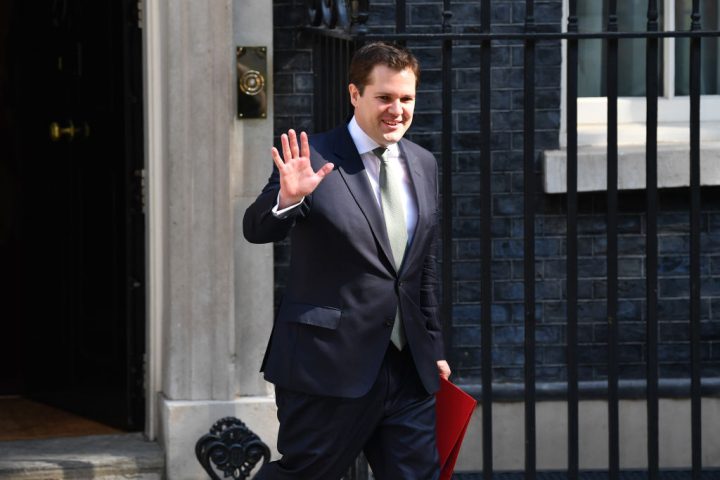Something significant happened in Westminster yesterday. The Immigration Minister made a speech which showed a thorough understanding of the damage done to British society by unchecked illegal migration.
Given that combating illegal, or ‘irregular’, migration is Robert Jenrick’s core task, you may feel that such an occurrence should be treated as commonplace. But here’s the thing: it hasn’t happened before.
To have a minister close to the PM make such a speech should be acknowledged as an important breakthrough
It certainly hasn’t since the small boats phenomenon got going in earnest four years ago. The likes of Caroline Nokes, who held the post under Theresa May, or Tom Pursglove, who sat in the chair for a few weeks under Liz Truss, never got round to it.
When Boris Johnson was PM, he relegated the post of Immigration Minister to Parliamentary Under-Secretary level – the most junior rung of the ministerial ladder – and tended to make fitful and disorganised interventions on the subject himself.
But in a speech to the Policy Exchange thinktank, Mr Jenrick gave long-suffering voters a reason to hope that the years of Tory uselessness on the issue are coming to an end. In his speech, which has naturally been condemned by migrant pressure groups as being ‘straight from the far-right’s playbook’, Jenrick unleashed a series of home truths that his predecessors shied away from or simply failed to grasp.
‘Mass irregular migration will be one of the defining characteristics of the 21st century. How to stop it, and how to maintain sovereign borders, is one of the defining policy questions of our time,’ he began.
There followed a dismantling of the case for the international status quo: when the Refugee Convention was signed in 1951, there were an estimated two million people worldwide who might have qualified as refugees. Now there are 45 million.
The prime motivating factor for irregular migration is financial, he said, ‘those in areas of low economic opportunity will seek out better prospects elsewhere’; modern communications mean that the thought of reaching the UK is ‘no longer an impossible dream, but an option’; many more will come if border integrity is not re-established.
Remarkably, Jenrick’s argument for creating a much tougher regime was anchored in actual Conservative principles, or at least in what has recently been dubbed ‘National Conservatism’: ‘Conservatives should not shy away from their belief that the nation has a right to preserve itself – and that the fundamental responsibility of the government in a democratic society is to further the interests of the inhabitants that constitute this national community over those outside it.’
Just as importantly, here was a Tory minister ready to confront in blunt terms the impact of soaring illegal immigration numbers on public morale and community cohesion: ‘Put simply: excessive, uncontrolled migration threatens to cannibalise the compassion of the British public.’ By this, Jenrick was suggesting that a feeling of ‘estrangement’ within their neighbourhoods would leave individuals ‘less likely to trust their neighbours or make sacrifices which sustain communities’.
In the speech he also dared to dwell on the cultural difficulties caused by cross-Channel arrivals, rather than merely the volumes: ‘Those crossing tend to have completely different lifestyles and values to those in the UK,’ he suggested.
He then set out the case for the Illegal Migration Bill in fundamentalist terms: ‘If states are to retain their sovereignty – their ability to exclude individuals from their territory – then they need to find new ways to enforce their laws. Deterrence must be restored. Those that make illegal journeys must know that it will be a futile endeavour.’
It would be easy to dismiss this as guff or just more warm words – and given the flannel voters were palmed off with under May and Johnson such a temptation is understandable. But before you do so, I urge you to appreciate the daring of Jenrick in citing such things as the book Whiteshift by the UK-based Canadian political scientist Eric Kaufmann and the specific case of an illegal migrant posing as a child who murdered a British citizen.
He even touched on a recent study by the University of Amsterdam on the long-term cost of settling asylum seekers from different countries or continents (‘the cost to the state from the average asylum seekers from the Middle East or North Africa was roughly €650,000 per individual’).
Jenrick also gave a cogent and thorough explanation of how the government’s radical approach, including its current legislation, can bring the current racket to an end. To have a minister known to be personally close to the prime minister make such a speech, couched in such straightforward terms, should be acknowledged by all those who care about this issue as an important breakthrough.
It adds up to the sound of the framework of what is deemed acceptable, set in place long ago by the cultural left, finally being moved. Perhaps that is why the BBC has so far chosen to ignore it.







Comments